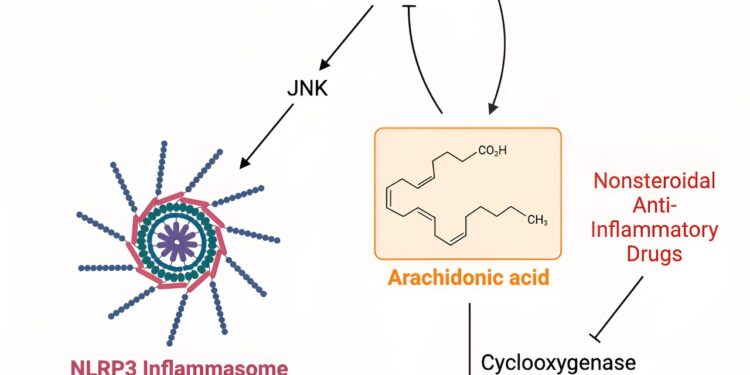Graphical summary. Credit: Cell Reports (2024). DOI: 10.1016/j.celrep.2024.113700
Cambridge scientists may have discovered a new way in which fasting helps reduce inflammation, a potentially damaging side effect of the immune system that is behind a number of chronic diseases.
In an article titled “Arachidonic acid inhibition of the NLRP3 inflammasome is a mechanism to explain the anti-inflammatory effects of fasting,” published in Cell Reports, the team describes how fasting increases levels of a chemical in the blood called arachidonic acid, which inhibits inflammation. Researchers say it could also help explain some of the beneficial effects of drugs such as aspirin.
Scientists have known for some time that our diet, particularly a high-calorie Western diet, can increase our risk of diseases including obesity, type 2 diabetes and heart disease, which are linked to chronic inflammation of the body.
Inflammation is our body’s natural response to injury or infection, but this process can be triggered by other mechanisms, including the so-called “inflammasome”, which acts as an alarm in cells in our body, triggering inflammation to help protect our body when it occurs. feels the damage. But the inflammasome can trigger inflammation unintentionally: one of its functions is to destroy unwanted cells, which can lead to the release of cellular contents into the body, where it triggers inflammation.
Professor Clare Bryant from the Department of Medicine at the University of Cambridge said: “We are very interested in understanding the causes of chronic inflammation in the context of many human diseases, and in particular the role of the inflammasome. .
“What has become evident in recent years is that one inflammasome in particular, the NLRP3 inflammasome, is very important in a number of major diseases such as obesity and atherosclerosis, but also in diseases such as Alzheimer’s disease and Parkinson’s disease, as well as in many diseases associated with old age people, especially in the Western world.
Fasting may help reduce inflammation, but the reason is unclear. To answer this question, a team led by Professor Bryant and colleagues from the University of Cambridge and the National Institute for Health in the United States studied blood samples from a group of 21 volunteers, who ate a 500 kcal meal then fasted for 24 hours. before consuming a second meal of 500 kcal.
The team found that restricting calorie intake increased levels of a lipid called arachidonic acid. Lipids are molecules that play important roles in our body, such as storing energy and transmitting information between cells. As soon as individuals ate again, arachidonic acid levels decreased.
When researchers studied the effect of arachidonic acid on immune cells grown in the laboratory, they found that it inhibited the activity of the NLRP3 inflammasome. This surprised the team, as arachidonic acid was previously thought to be linked to increased levels of inflammation, not decreased levels.
Professor Bryant, a fellow at Queens’ College, Cambridge, added: “This provides a potential explanation for how changing our diet, particularly through fasting, protects us from inflammation, particularly the damaging form which is the cause of many diseases linked to a high Western calorie diet.
“It’s too early to say whether fasting protects against diseases like Alzheimer’s and Parkinson’s because the effects of arachidonic acid are only short-lived, but our work adds up to an amount growing body of scientific literature that highlights the health benefits of calorie restriction. This suggests that regular fasting over a long period of time could help reduce the chronic inflammation we associate with these conditions. It’s certainly an interesting idea. »
The findings also suggest a mechanism by which a high-calorie diet might increase the risk of these diseases. Studies have shown that some patients who eat a high-fat diet have increased levels of inflammatory activity.
“There might be a yin and yang effect here, where too much of the wrong thing increases your inflammatory activity and too little decreases it,” Professor Bryant said. “Arachidonic acid could be a way for this to happen.”
The researchers say the discovery could also offer clues to an unexpected way that so-called nonsteroidal anti-inflammatory drugs, such as aspirin, work. Normally, arachidonic acid is quickly broken down in the body, but aspirin stops this process, which can cause arachidonic acid levels to increase, reducing inflammatory activity and therefore inflammation.
Professor Bryant said: “It is important to stress that aspirin should not be taken to reduce the risk of long-term illnesses without medical advice, as it can have side effects such as stomach bleeding if taken. is taken over a long period. »
More information:
Milton Pereira et al, Arachidonic acid inhibition of the NLRP3 inflammasome is a mechanism to explain the anti-inflammatory effects of fasting, Cell Reports (2024). DOI: 10.1016/j.celrep.2024.113700
Provided by the University of Cambridge
Quote: Scientists identify how fasting can protect against inflammation (January 30, 2024) retrieved January 30, 2024 from
This document is subject to copyright. Except for fair use for private study or research purposes, no part may be reproduced without written permission. The content is provided for information only.



